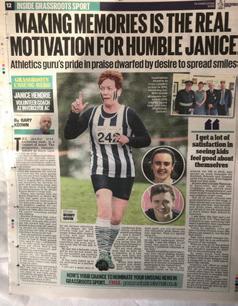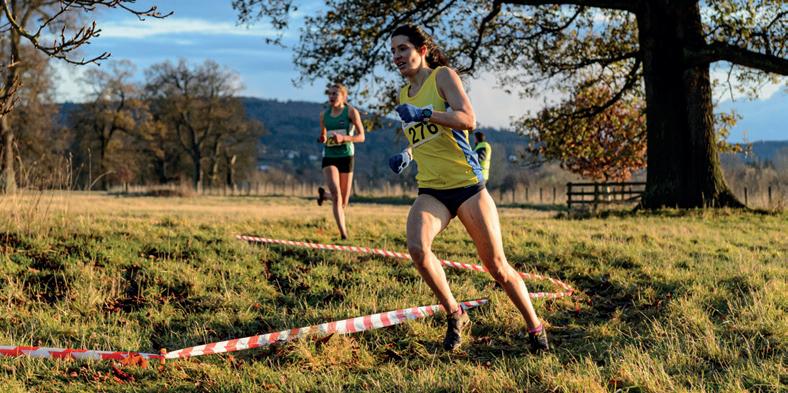
6 minute read
Grassroots Athletics: Andy Young
Memories mean more than medals for Inverclyde inspiration Janice
Athletics helps young people in life as well as in sport
Advertisement
By Gary Keown
The medal sits, gathering dust, in a cabinet at home. The memories, though, radiate as much light and joy as ever.
It is a state of affairs that refl ects perfectly the attitude which Janice Hendrie still uses to guide her long and prestigious career as a volunteer coach within athletics in Scotland.
Memories are the currency by which she measures her success and there are few more special than the one of that magical day in Greenock’s Municipal Chambers back in August 2015 in which she was honoured for services to sport and wellbeing along with her late father Jimmy through the presentations of the British Empire Medal to them both.
Jimmy, who served with the Royal Engineers in World War Two, had spent more than 60 years promoting badminton in the west of Scotland. He inspired his daughter, making her own move into coaching junior runners in the mid-1980s after becoming a PE teacher something natural and fulfi lling.
Sharing moments that colour lives has always been Hendrie’s motivation. Even now, with people she has worked with past and present at Inverclyde AC, meeting up around the neighbourhood and reliving old tales of shared experience serves as her fuel.
That unforgettable occasion she enjoyed with her father shortly before he took ill, fi nally passing away aged 91, was a celebration of the gifts sport had given to them and others. How it had shaped their existences and honed their relationships.
The medal was nice, as medals always are, but Hendrie has always understood the most meaningful prizes tend to be kept in the heart rather than worn round the neck.
‘My dad died at the beginning of 2017 and that day we got our medals together was one of the last times he was really good,’ recalled the sprightly 65-year-old, who also won BBC Scotland’s Unsung Hero award in 2013. dad actually took not well a couple of days after, stopped driving and just went downhill from there.
‘For him to have had that experience was great and it was lovely that he was able to enjoy it.
‘My dad was a fantastic coach and he was my role model. He set the standard and coaching became a natural thing for me to do.
‘It was really linked up to my profession as a teacher as well.
‘I just get a great deal of satisfaction from seeing children achieve something - and it doesn’t mean getting a medal or anything. Just seeing them feel good about themselves makes me feel good.
‘It’s not even about what they do later on in athletics. It is just about how they are getting on in life. Being happy. When you meet people you dealt with, even if they didn’t keep doing their sport, you tell old stories and remember great times you had together.

That is a special thing too.
‘I was always introduced to folk as my dad’s badminton failure, though. I was the oldest in the family and played the least - because I preferred volleyball at the time.’
Hendrie’s coaching career hasn’t only been about making friends and having fun, though. Of the thousands of kids she has dealt with down the years, many *have* gone on to become accomplished performers at the highest level.
Hendrie, who carried the Olympic torch on its travels around the UK in 2012, also served as team manager for Scottish Schools and crossed paths with so many of our biggest track and fi eld stars.
In Laura Muir and Jake Wightman, in particular, she saw two youngsters who proved what confronting disappointment and failure in sport can do for character and resilience longer term.
‘Not all of those athletes had good experiences at that stage of their careers and you have to help them get over that,’ said Hendrie, now seven years retired from her old job in the PE department of Notre Dame High School in Greenock.
‘I saw many like that and a lot went on to do well. They had the resilience to take something that wasn’t a good fi rst-time experience and do something about it.
‘Laura, for example, never got into a Scottish Schools team. She always just missed it, but she had that desire.
‘Jake was a great example too. He went right up in my estimation because of his courage.
‘When he was 16, he was picked to run at the UK School Games and withdrew because he didn’t feel he was performing well.
‘So many would have been frightened to do that and I think it was a really brave thing for such a young boy to do. I hold him in such high esteem.
‘Athletics just offers so many opportunities for development. You are an individual in these events, other than the relays, and you need to learn to socialise and get on with people as well.
‘You learn to stand on your own two feet and it will be great when we get over these diffi cult times we are living through and can get back to that again.’
By Andy Young
Andy Young coaches a number of elite Scottish athletes and has been hugely instrumental in the rise of Laura Muir and Jemma Reekie.
After guiding the star duo to a series of superb performances last year, he was named as 4J Studios Performance Coach of the Year at our 2020 4J Studios Awards.
But Andy is acutely aware of the pathway in Scotland which leads from grassroots to elite and is always keen to highlight that link . . .
'Grassroots sport is crucial to success at elite level but, in reverse, elite highperformance sport is really important to helping drive grassroots participation in many sports.
'It’s a symbiotic relationship in which if both aspects of sport are to succeed long-term, it needs both parts of the sport to do well.
'Seeing people from your country do well and be appreciated for this success encourages youngsters to want to try or continue to pursue the sport. It is the shop window for so many sports.
'If you fl ip the coin, generally the wider the base of the pyramid — the grassroots in the case — the more likely you are to uncover the talent in the community, and the more who are likely to ultimately make it to the upper echelons of elite sport in later years.
'Hopefully if you can get both parts of the sport doing well you can help create a continuous cycle that goes on for many years. continuous work and effort — it’s not just sit back and admire the successes when they happen.
'It requires people prepared to give up their time and make efforts to make it happen at all levels of the sport.
'The work that volunteers at clubs up and down the country do should not be understated. They form such a crucial part of future success.
'Without the role these volunteers play, it would be impossible to have the success at senior or international level we have today in many sports.'











